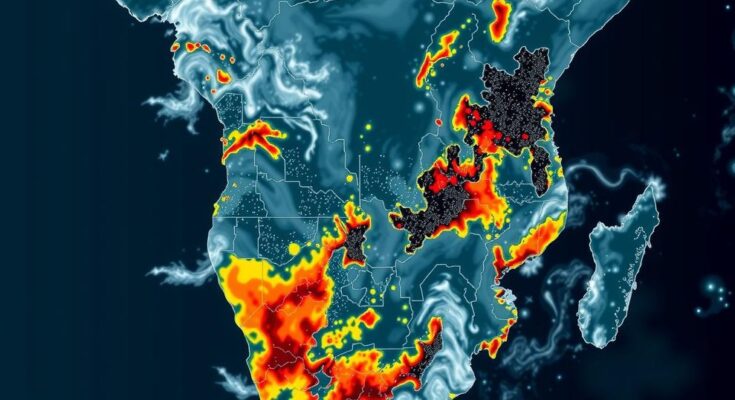A recent report indicates that climate change has exacerbated intense rainfall and flooding in several African nations, leading to significant loss of life and displacement. Scientists note that if warming persists, such extreme weather could become a regular occurrence, emphasizing the need for preventive measures and international financial support for affected regions.
Recent devastating floods across West and Central Africa, notably in Cameroon, Chad, Niger, Nigeria, and Sudan, have been exacerbated by human-induced climate change, according to a team of international scientists. These experts, affiliated with World Weather Attribution (WWA), indicated that global warming has intensified the seasonal rainfall, making it approximately 5-20% heavier in the affected regions this year. Such extreme rainfall patterns are increasingly becoming a permanent feature due to rising temperatures, as noted by Izidine Pinto from the Royal Netherlands Meteorological Institute. The consequences of these floods have been dire, claiming around 1,500 lives and displacing over a million people, as reported by the United Nations Office for the Coordination of Humanitarian Affairs (OCHA). The torrents have overwhelmed dam systems in Nigeria and Sudan, further intensifying the crisis. The WWA warned that if global temperatures rise by 2 degrees Celsius (3.6 degrees Fahrenheit), which is projected to occur as early as the 2050s, the regions may experience such heavy downpours almost every year. The researchers emphasized the urgent need for investment in early warning systems and improvements to dam infrastructure to mitigate future disasters. “Africa has contributed a tiny amount of carbon emissions globally, but is being hit the hardest by extreme weather,” stated Joyce Kimutai, a researcher at the Centre for Environmental Policy at Imperial College, underscoring the urgency of addressing climate impacts on the continent. The upcoming COP29 climate talks in November are seen as crucial for securing significant financial contributions from wealthier nations to assist Africa in combatting these challenges.
The link between climate change and extreme weather events has been a subject of increasing concern among scientists. As global temperatures rise, the frequency and intensity of severe weather, including heavy rainfall and flooding, are expected to increase, particularly in vulnerable regions such as Africa. The current analysis regarding floods in West and Central Africa emphasizes the need to understand how climate change affects rainfall patterns, leading to devastating humanitarian crises in areas that have historically contributed minimally to global carbon emissions. The understanding of these dynamics is essential for informing policy and funding decisions aimed at mitigating climate impacts.
In summary, the intensified rains and resultant flooding in African nations have been directly linked to human activities contributing to climate change. The increase in severe weather patterns poses significant risks to lives and livelihoods in the region. With projections indicating that such weather could become more frequent without substantial global efforts to address climate change, there is an urgent call for enhanced support from developed nations during upcoming climate negotiations. This highlights the critical need for global cooperation to assist the most affected regions in managing and adapting to the realities of climate change.
Original Source: www.usnews.com




